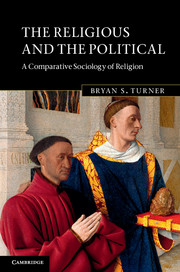12 - Popular religion and popular democracy
Published online by Cambridge University Press: 05 April 2013
Summary
Introduction: unpopular religion
Through most of the chapters so far I have concentrated on what we can regard as official, formal or institutionalized religions. I have concentrated on the literati in Confucianism, the Buddhist monks, and the priests and ministers of the Christian churches. In asking about the relationships between politics and religion I have examined the literate and formal dimensions of public religions. More specifically, my discussion of religion and politics has concentrated on the church and the state. However, religion in modern societies has become more informal, unofficial and post-institutional; in short, it has become popular. In order to round out our consideration of religion and politics we will have to attempt a definition of ‘popular religion’ and then to offer some examples. While it turns out that defining ‘popular religion’ is difficult, the thesis of this chapter is that in the modern world religion and politics have followed a similar trajectory. They have both become ‘popular’ in so far as they have become ‘democratic’. As expressions of popular democratic culture the tension between religion and politics tends to disappear, and at the same time charisma is slowly converted into celebrity. There is one other equally important feature in modern society: popular religion is global.
In his contribution to The religious significance of atheism (Ricoeur and MacIntyre, 1969) Alasdair MacIntyre makes the point that atheism is only a serious option in a culture that has a dominant tradition of theism. It is for this reason that sociological conferences on unbelief or atheism in the contemporary world are not worth attending. A similar argument might be made about ‘popular religion’. Taking popular religion seriously is probably only a real intellectual option in a society where a formal orthodoxy is still on the agenda. The idea of something being ‘popular’ in religious terms implies there is a hegemonic, comprehensive and commanding alternative to which the popular manifestations of religious life are subordinated, and probably oppositional.
- Type
- Chapter
- Information
- The Religious and the PoliticalA Comparative Sociology of Religion, pp. 227 - 243Publisher: Cambridge University PressPrint publication year: 2013



